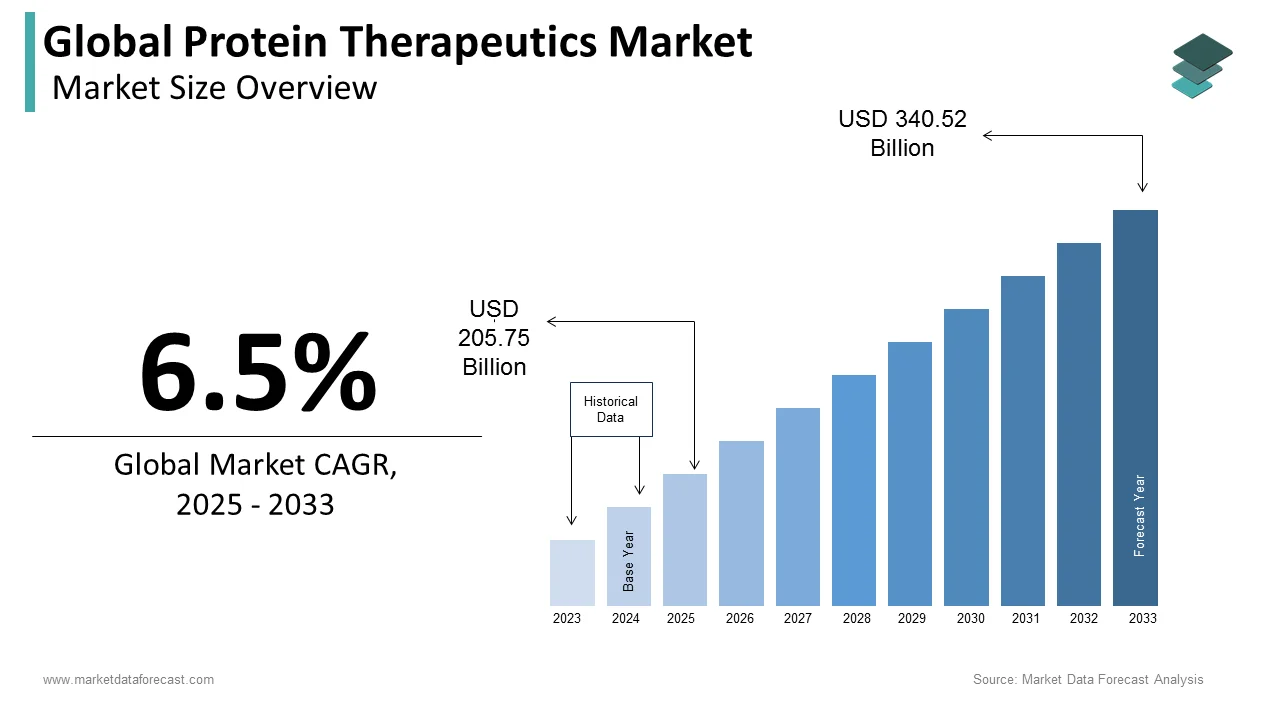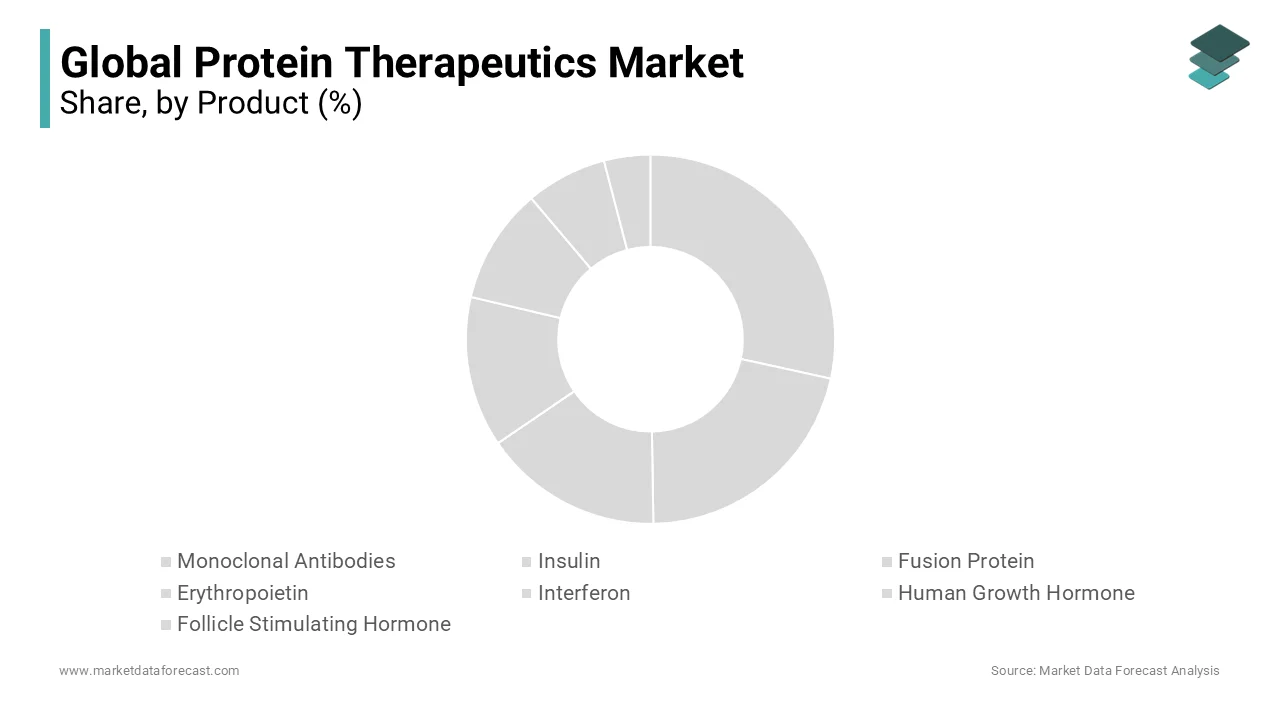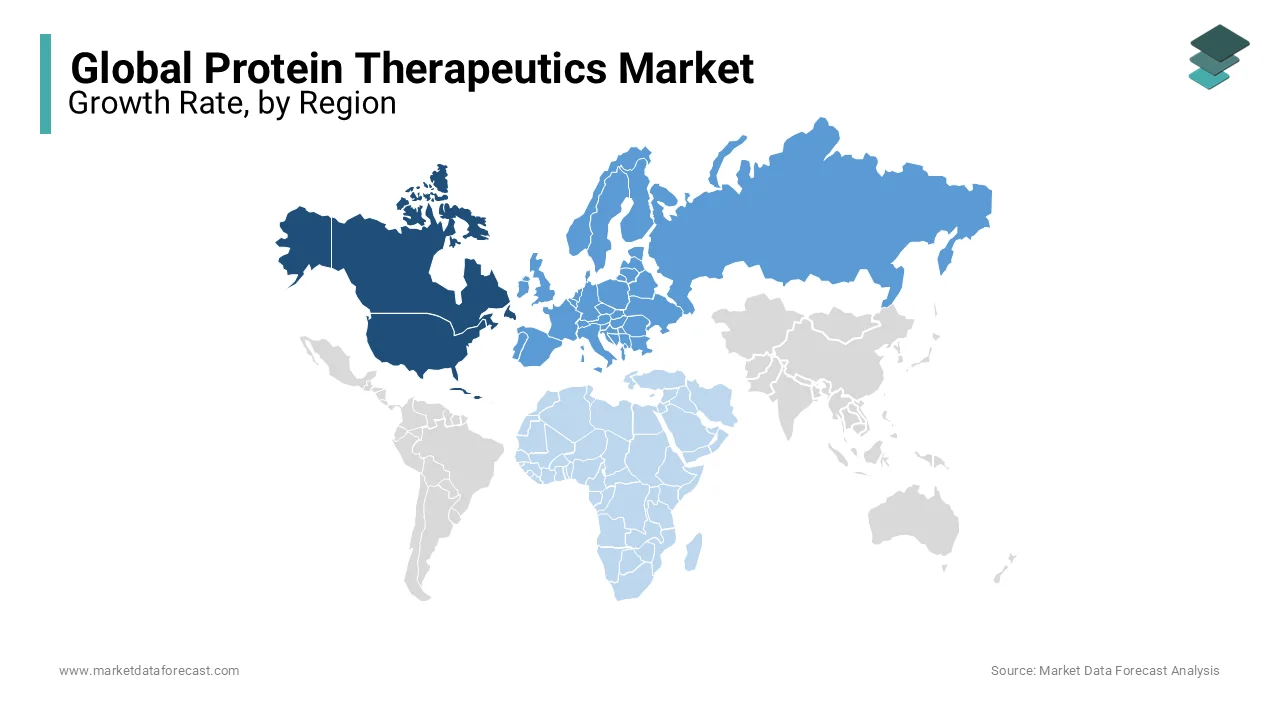Global Protein Therapeutics Market Size, Share, Trends & Growth Forecast Report By Product (Monoclonal Antibodies, Insulin, Fusion Protein, Erythropoietin, Interferon, Human Growth Hormone and Follicle Stimulating Hormone), Application, Therapeutic Modalities and Region (North America, Europe, Asia-Pacific, Latin America, Middle East and Africa), Industry Analysis From 2025 To 2033.
Global Protein Therapeutics Market Size
The size of the global protein therapeutics market was around USD 193.19 billion in 2024. The global market is expected to grow at a CAGR of 6.5% between 2025 to 2033 and be worth USD 340.52 billion by 2033 from USD 205.75 billion in 2025.

Protein therapeutics are often employed in treating chronic diseases such as cancer. Therefore, the protein therapeutics market has enormous potential in the coming years. Protein therapy refers to drugs made from proteins that are artificially synthesized. These powerful, fast-acting drugs deliver small protein molecules to the body in a specific amount. They usually consist of recombinant forms of natural proteins, such as monoclonal antibodies, insulin, fusion proteins, erythropoietin, interferon, human growth hormones (HGH), and follicle-stimulating hormone. They help treat chronic medical conditions, such as cancer, diabetes, neurodegenerative and immune, hematological, hormonal, and genetic disorders. In addition, various combination therapy drugs are also used with therapeutic proteins, inhaled, injected, or administered orally.
MARKET DRIVERS
The growing demand for protein therapeutics, the increasing prevalence of chronic diseases, and the development of plasma-derived therapies are driving the global protein therapeutics market growth.
The growing awareness of the masses about the benefits of protein therapies, such as minimal risks of side effects and high efficacy, contributes to the market's growth. Monoclonal antibodies are widely studied and used to treat various viral and bacterial diseases, and pharmaceutical companies use protein therapies for drug discovery and development. The sudden outbreak of coronavirus disease (COVID-19) offers growth opportunities for the protein therapeutics market growth for the forecast period. Furthermore, creating awareness among the population regarding protein therapeutics can influence market growth. Increasing incidences of chronic diseases such as cancer, cardiovascular conditions, and diabetes are expected to drive market growth during the forecast period. The high efficiency of therapeutics with minimum risk of side effects increases the acceptance among the end-users.
Furthermore, the global protein therapeutics market is supported by the rapid rise in technological advancements and the wide usage of mABs (monoclonal antibodies) to treat several diseases. Many FDA approvals include Trastuzumab, Ranibizumab, Rituximab, Panitumumab, Ofatumumab, Pembrolizumab, Alemtuzumab, Cetuximab, ipilimumab, Gemtuzumab ozogamicin, are now available. Moreover, the global protein therapeutics market is further accelerated by the rising awareness about protein therapeutics and rapid growth in adapting plasma-derived therapies to manage chronic disorders. Additionally, many initiatives were taken by the various governments to develop the healthcare sector by providing favorable conditions to contribute a significant boost to the global protein therapeutics market.
MARKET RESTRAINTS
High expenditure on protein therapies and strict regulatory framework related to the product's approval are major restraints of the protein therapeutics market.
In addition, the high cost of installing and maintaining the devices in laboratories and stringent government regulations towards protein therapeutics restrict the market growth of the protein therapeutics market. Furthermore, the physiochemical instability of proteins and immunogenicity are majorly restricting the global protein therapeutics market over the forecast period. Stringent regulations related to product approval are expected to propel market growth.
REPORT COVERAGE
|
REPORT METRIC |
DETAILS |
|
Market Size Available |
2022 to 2033 |
|
Base Year |
2024 |
|
Forecast Period |
2025 to 2033 |
|
Segments Covered |
By Product, Application, Therapeutic Modalities, and Region |
|
Various Analyses Covered |
Global, Regional & Country Level Analysis, Segment-Level Analysis; DROC, PESTLE Analysis; Porter’s Five Forces Analysis, Competitive Landscape, Analyst Overview of Investment Opportunities |
|
Regions Covered |
North America, Europe, APAC, Latin America, Middle East & Africa |
|
Key Market Players |
Baxter International Inc., Eli Lilly and Company, Abbott Laboratories, Amgen Inc., F. Hoffmann-La Roche Ltd., Novo Nordisk A/S, Pfizer Inc., Johnson & Johnson, Merck & Co., Inc., and Sanofi. |
SEGMENTAL ANALYSIS
Global Protein Therapeutics Market Analysis By Product
The monoclonal antibodies segment captured the largest share of the global market in 2024 and is projected to remain the top leading segment in the forecast period. Monoclonal antibodies are extracted or developed from a similar parent immune cell for recognizing or targeting specific cells. Those antigens will behave as antibodies in tandem with the human immune system against them. Monoclonal Antibodies will be used to treat complications in medical to substance cancer, viral infection, poisoning, septicemia, abuse, and asthma. This segment is accounting for fast growth by product segment.

The insulin segment is anticipated to hold a considerable share of the global market during the forecast period. The crucial and primary hormone in our body is Insulin. Insulin hormone plays a vital role in controlling levels of blood glucose. People with diabetes due to a shortage of insulin levels in the blood. Insulin is crucial in managing people with diabetes and can lead to complications. Therefore, the insulin segment contributes a large share of the protein therapeutics market.
The fusion protein segment is expected to grow at a healthy CAGR during the forecast period. Wide range of uses to treat cancer by the fusion protein. Two different genes manufacture fusion proteins. Therefore, this segment is a contributing share of the protein therapeutics market.
The erythropoietin segment is projected to be growing steadily in the coming years. This is because erythropoietin will promote the formation of red blood cells produced by the kidney through the bone marrow. Therefore, the erythropoietin segment is also attributing share.
Interferon is used to treat multiple sclerosis (MS), several cancer forms, and hepatitis C due to being synthesized by a signalling group. It is released by the host cell in response to protect against several viruses.
A human growth hormone is a small protein formed in the pituitary gland by secreting it within the bloodstream. Production of human growth hormone will help control complex hormones in the brain's hypothalamus, intestinal tract, and pancreas.
The pituitary gland produces Follicle-stimulating hormone, an essential hormone for normal functions of reproduction systems in both genders. Therefore, this segment is also attributed to the largest share of the protein therapeutics market.
Global Protein Therapeutics Market Analysis By Application
In 2024, the metabolic disorders segment accounted for the highest market share. However, the cancer segment is predicted to grow the fastest in the forecast period.
Among all these segments, the cancer segment contributes the most significant share by recording a high compound annual growth rate over the forecast period. The cancer segment owns many advantageous factors, such as a rise in cancer prevalence leading to an increase in demand for the protein therapeutics market. As per the International Agency for Research on Cancer, nearly 1,80,78,957 cancer cases are detected worldwide. Expecting these factors to be drivers of the cancer segment.
Metabolic disorders are related to the pancreas or liver in the body due to the increment in metabolic disorders like heart attacks, Gaucher's diseases, and diabetes. Analysts at MarketDataForecast forecasted that these t factors will drive significant growth in the market over the forecast period.
REGIONAL ANALYSIS
North America was the leader in the global protein therapeutics market in 2024 and this trend is likely to continue in the forecast period. North America has dominated the global protein therapeutics market, with around half of the market in the United States due to high medical reimbursement facilities and technological advancements.

Europe was registered as the second largest revenue region globally in 2024 due to developed countries such as Germany, France, Italy, and the UK in the European region. Moreover, the European market growth is driven by improved healthcare infrastructure and increased healthcare expenditure. Nowadays, increased cases of rheumatoid arthritis, chronic inflammatory demyelinating polyneuropathy, and multiple sclerosis result in the growth of the protein therapeutics market over the forecast period. As per the national Rheumatoid Arthritis Society report, nearly 4,00,000 patients had rheumatoid arthritis. These are the boosting factors of the European region in the forecast period.
Asia-Pacific will grow with the highest CAGR in the forecast period due to growing awareness about these novel treatment methods in emerging economies. Asia-Pacific is expected to grow faster due to the rapid increase in chronic diseases, increased consumer awareness, supportive government policies, modernization of health infrastructure, and population growth in developing countries like China and India in this region. The monoclonal antibody sector holds the highest market share in the protein therapy market among all types due to the higher prevalence of cancer patients.
Latin America is driven by the Growing research and development activities in the protein engineering sector, significant advancements in the healthcare domain, and Y-O-Y growth in the incidence of chronic diseases. In addition, increasing consumer awareness regarding protein therapeutics is another prominent factor driving the market.
The market in MEA is expected to grow at a CAGR of 5.93%, capturing 8% of the global market share. In the UAE, there are over 1 million people diagnosed with diabetes, and 19% of the total population in the UAE is suffering from diabetes. The UAE government has come forward by making some initiatives, like arranging campaigns to bring awareness to people regarding the significance of healthy food habits and regular exercise.
KEY PLAYERS IN THE GLOBAL PROTEIN THERAPEUTICS MARKET
Companies profiled in this report that play a promising role in the global protein therapeutics market are Baxter International Inc., Eli Lilly and Company, Abbott Laboratories, Amgen Inc., and F. Hoffmann-La Roche Ltd. Other players in the market are Novo Nordisk A/S, Pfizer Inc., Johnson & Johnson, Merck & Co., Inc., and Sanofi.
RECENT HAPPENINGS IN THE GLOBAL MARKET
- Molecular Partners AG, a Swiss clinical-stage biotechnology company, is developing a new class of therapeutic proteins called DARPin® to inhibit viral proliferation.
- In 2018, Sanofi, a therapeutic solutions provider, acquired Ablynx for $ 4.8 billion. With this acquisition, Sanofi strengthens its R&D strategy by integrating the Ablynx Nanobodies technological platform. Sanofi will also focus on technologies that tackle multiple disease targets with unique and specific molecules.
- In 2018, the FDA approved 12 monoclonal antibodies for treating cancer disease and immune disorders.
DETAILED SEGMENTATION OF THE GLOBAL PROTEIN THERAPEUTICS MARKET INCLUDED IN THIS REPORT
This market research report on the global protein therapeutics market has been segmented and sub-segmented based on the product, application, therapeutic modalities, and region.
By Product
- Monoclonal Antibodies
- Insulin
- Fusion Protein
- Erythropoietin
- Interferon
- Human Growth Hormone
- Follicle Stimulating Hormone
By Application
- Metabolic Disorders
- Immunologic Disorders
- Hematological Disorders
- Cancer
- Hormonal Disorders
- Genetic Disorders
- Others
By Therapeutic Modalities
- Protein Diagnostics
- Protein Vaccines
- Protein Therapeutics with Special Targeting Activity
- Protein Therapeutics with Enzymatic Or Regulatory Activity
By Region
- North America
- Europe
- Asia Pacific
- Latin America
- Middle East & Africa
Frequently Asked Questions
How big is the global protein therapeutics market?
The global protein therapeutics market size is predicted to be valued at USD 340.52 billion by 2033
Which region will lead the protein therapeutics market in the future?
The Asia-Pacific region is anticipated to grow the fastest and North America is expected to continue leading the market in the coming years.
Which region had the highest share in the protein therapeutics market in 2024?
Geographically, the North America was the most dominating region in the global market in 2024.
Which are the companies playing a key role in the protein therapeutics market?
Baxter International Inc., Eli Lilly, and Company, Abbott Laboratories, Amgen Inc., F. Hoffmann-La Roche Ltd. Other players in the market are Novo Nordisk A/S, Pfizer Inc., Johnson & Johnson, Merck & Co., Inc., and Sanofi are a few of the noteworthy players in the protein therapeutics market.
Related Reports
Access the study in MULTIPLE FORMATS
Purchase options starting from $ 2500
Didn’t find what you’re looking for?
TALK TO OUR ANALYST TEAM
Need something within your budget?
NO WORRIES! WE GOT YOU COVERED!
Call us on: +1 888 702 9696 (U.S Toll Free)
Write to us: [email protected]
